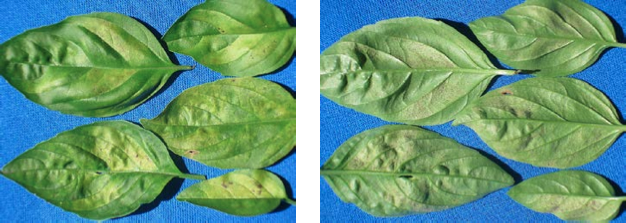
Fact Sheets And Publications
Basil Downy Mildew
DOWNY MILDEW ON BASIL is caused by an Oomycete pathogen that only goes to basil, but can be devastating. Symptoms include leaf yellowing, followed by dark lesions, and leaves of this popular herb become unusable. Spores are produced on the undersides of leaves, but can be confused with other fungi, dust and potting material. Confirmation is dependent on microscopic observation. The pathogen may be seed-borne, and asymptomatic plants may develop symptoms after sale. All sweet basil varieties are susceptible, but research is ongoing to test for sources of resistance.

Images above courtesy of Margaret McGrath, Cornell University;
Affected potted plants should have infected leaves removed or be discarded. The pathogen probably will not over-winter in Delaware, but could over-winter in a greenhouse or sheltered location. The phosphorus acid salts fungicide products are good for preventative control. The bio-rational fungicide, Actinovate, is also labeled on herbs, containing the bio-control micro-organism, Streptomyces. Any chemicals should be applied preventatively, according to the label, and may not provide good control once the disease can be seen sporulating on leaf tissue. Control also includes cultural practices to reduce leaf wetness and humidity. Light inhibits spore production, so light may be used to aid in control in high tunnels or greenhouse situations. Once plant infection is noted in the home garden, it is too late for control and plants should be removed. Infected plant material is not harmful to people or pets.
Nancy F. Gregory, Plant Diagnostician
UD Cooperative Extension
This institution is an equal opportunity provider.
In accordance with Federal law and U.S. Department of Agriculture policy, Cooperative Extension is prohibited from discriminating on the basis of race, color, national origin, sex, age, or disability.
